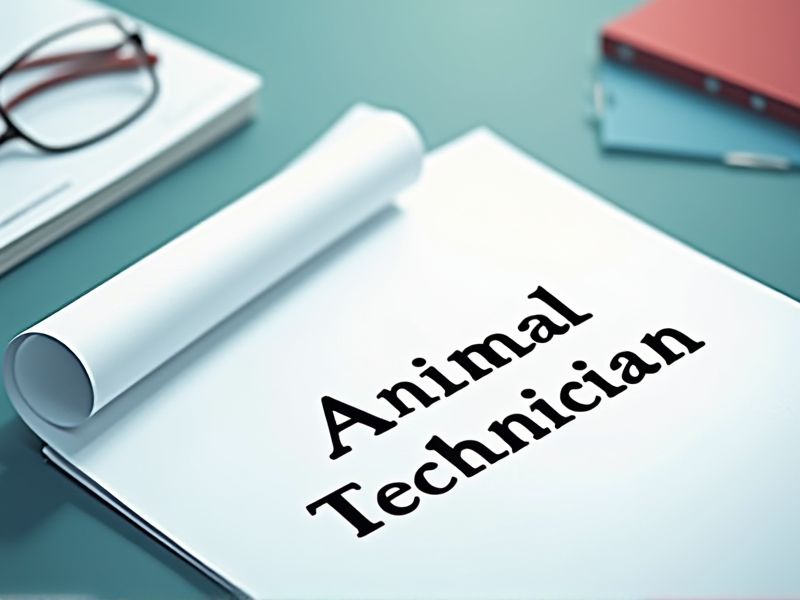
Laboratory Animal Technicians work with complex tasks involving animal care and research, which requires a deep understanding of ethical and technical protocols. Certifications ensure that technicians are equipped with the necessary knowledge of health regulations, animal welfare standards, and safety practices. These credentials also assure employers and research institutions of the technician's competence and adherence to industry standards. For those pursuing a career as a Laboratory Animal Technician, several important certifications may be essential.
AALAS Assistant Laboratory Animal Technician (ALAT) Certification
Obtaining the AALAS Assistant Laboratory Animal Technician (ALAT) Certification often results in enhanced knowledge of best practices in animal care, crucial for maintaining ethical and humane treatment standards in research settings. Certified technicians tend to be more proficient in understanding the technical aspects of laboratory procedures, reducing the risk of errors that could compromise research data. The certification often leads to greater employment opportunities and maybe a prerequisite for advancement in positions within laboratory research institutions. Many organizations value certified technicians due to their demonstrated commitment to professional development and adherence to industry regulations.
AALAS Laboratory Animal Technician (LAT) Certification
The AALAS Laboratory Animal Technician (LAT) Certification signifies a technician's expertise and understanding of laboratory animal care and use, ensuring adherence to ethical standards. Employers often require LAT certification to demonstrate a technician's commitment to professionalism and continuous learning. Certification equips technicians with the necessary skills to improve research quality and animal welfare. Having certified technicians can enhance the credibility and reputation of a research facility.
AALAS Laboratory Animal Technologist (LATG) Certification
The AALAS Laboratory Animal Technologist (LATG) Certification is needed for Laboratory Animal Technicians to demonstrate advanced knowledge in laboratory animal science, increasing their expertise in animal care and husbandry. Possession of this certification can enhance job prospects and career advancements within the field, reflecting a higher level of commitment and professionalism. Employers often seek certified professionals to ensure adherence to industry standards, promoting ethical and competent practices in the laboratory. The LATG Certification also fosters a deeper understanding of regulations and procedures, contributing to improved research outcomes and animal welfare.
IACUC Training Certification
The IACUC Training Certification ensures that Laboratory Animal Technicians understand and comply with ethical guidelines for animal care and use. It enhances knowledge of species-specific handling, which reduces stress and harm to animals, promoting better research outcomes. Certification serves as a safeguard by aligning technicians with legal and institutional requirements, thus preventing potential policy violations. Possession of the certification often enhances a technician's credibility and employability within research institutions.
CITI Program Animal Research Ethics Certification
The CITI Program Animal Research Ethics Certification ensures Laboratory Animal Technicians understand ethical standards, promoting humane treatment of animals. This certification reduces the risk of non-compliance with regulatory requirements, avoiding potential legal issues. It helps technicians identify and address ethical dilemmas in research settings, enhancing overall research integrity. Proper training boosts confidence in handling animals, which improves experiment accuracy and reliability.
Occupational Health and Safety (OSHA) Certification
Laboratory Animal Technicians often work with hazardous substances and equipment, which increase the risk of workplace accidents, and OSHA certification ensures they understand how to minimize these risks. OSHA certification provides critical training in handling biological and chemical hazards, benefiting both employees and animals. Compliance with OSHA standards helps organizations avoid legal penalties, maintaining their reputation and operational continuity. Ensuring technicians are OSHA-certified elevates the overall safety culture, leading to reduced injury rates and increased efficiency.
Hazardous Materials Management Certification
Laboratory Animal Technicians often work with chemicals that could pose risks if not handled properly. Obtaining a Hazardous Materials Management Certification ensures they have the knowledge to safely manage these substances. Incorrect handling could lead to health risks for both the technicians and the animals. Certification helps maintain a safer working environment and compliance with regulations.
Good Laboratory Practice (GLP) Certification
Good Laboratory Practice (GLP) Certification ensures that Laboratory Animal Technicians adhere to standardized procedures, which enhances study reliability and reproducibility. Compliance with GLP guidelines improves the accuracy and credibility of research findings, which is critical for regulatory approval processes. Proper GLP certification promotes ethical treatment and welfare of laboratory animals, reducing the risk of research bias stemming from substandard animal care. Laboratory facilities with GLP Certification demonstrate a commitment to quality assurance, which can attract more research funding and collaborations.
AAALAC International Accreditation Training
AAALAC International Accreditation Training helps ensure Laboratory Animal Technicians understand best practices in animal care and welfare. With this training, technicians gain detailed knowledge of ethical standards and compliance regulations. Better training results in improved research conditions and more reliable scientific outcomes. Accreditations also enhance institutional credibility and support funding opportunities.
Laboratory Animal Care and Use Certification
Certification in Laboratory Animal Care and Use ensures that technicians possess the necessary knowledge to handle and care for animals according to established ethical standards. Lack of proper certification could lead to unintentional harm to animals and compromised research results. Certified technicians contribute to maintaining compliance with federal and institutional regulations, thereby reducing the risk of legal repercussions. The certification process also fosters a culture of responsibility and accountability within research facilities, improving overall research integrity and animal welfare.
Summary
When you obtain certifications as a Laboratory Animal Technician, you enhance your professional credibility and demonstrate commitment to animal welfare standards. Certification can lead to increased job opportunities and potential for higher salaries in the field. Your specialized skills and knowledge are recognized, making you a valuable asset to research teams. Employers may prioritize certified technicians for positions requiring stringent compliance with ethical and scientific protocols.
